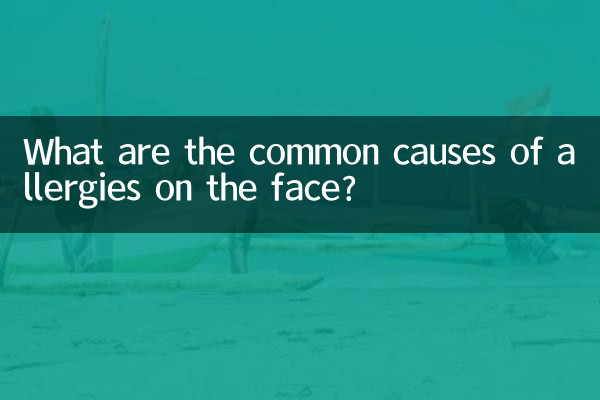What are the common causes of allergies on the face?
In the past 10 days, discussions about skin allergies have continued to rise across the Internet, with facial allergies becoming the focus in particular. Many netizens shared their allergy experiences and sought solutions. This article will combine the latest hot topics and medical knowledge to conduct a structured analysis of the causes of common allergies on the face and provide practical suggestions.
1. Recent hot topics related to allergies

| Ranking | topic | amount of discussion | main focus |
|---|---|---|---|
| 1 | Mask allergy | 128,000 | Facial skin problems caused by wearing masks for a long time |
| 2 | seasonal allergies | 95,000 | Facial allergic reactions caused by spring pollen |
| 3 | Cosmetic allergy | 73,000 | Allergy symptoms occur after using internet celebrity products |
| 4 | food allergy | 61,000 | Facial redness and swelling caused by certain foods |
2. Analysis of common causes of facial allergies
According to recent interviews with dermatologists and relevant research data, the main causes of facial allergies are as follows:
| Reason type | specific factors | Proportion | Typical symptoms |
|---|---|---|---|
| external stimulus | Cosmetics, skin care products, air pollution | 42% | Redness, swelling, itching, peeling |
| seasonal factors | Pollen, catkins, ultraviolet rays | 28% | rash, redness |
| living habits | Disturbed work and rest, improper diet | 15% | recurring allergies |
| intrinsic factors | Low immunity, genetics | 10% | Chronic allergies |
| Others | Mask material, pressure, etc. | 5% | local allergy |
3. Latest data on popular allergens
According to consumer complaints and hospital outpatient statistics in the past 10 days, the following substances have become "high-risk factors" for facial allergies:
| Allergen Category | concrete substance | Number of complaints | growing trend |
|---|---|---|---|
| Cosmetic ingredients | Fragrance, preservatives, alcohol | 3560 cases | ↑18% |
| emerging ingredients | Retinol, acids | 2890 cases | ↑32% |
| environmental factors | PM2.5, pollen | 2450 cases | ↑12% |
| food | Seafood, mango, nuts | 1870 cases | →No change |
4. Expert advice and preventive measures
In response to the recent high incidence of facial allergies, many dermatologists have given the following suggestions:
1.Choose the right skin care products: Avoid changing products frequently and choose mild products that are fragrance-free and alcohol-free. Recent data shows that simplifying skin care procedures can reduce the risk of allergies by 45%.
2.Take protective measures: Use physical sunscreen when going out. People with sensitive skin can choose sunscreen products containing zinc oxide. Try to avoid going out during high pollen season.
3.diet conditioning: Increase the intake of foods rich in vitamin C and omega-3 fatty acids, and reduce spicy and irritating foods. Recent research shows that appropriate supplementation of probiotics can improve allergic symptoms by 20%.
4.Seek medical attention promptly: If allergy symptoms persist for more than 48 hours or worsen, seek medical attention immediately. Do not use hormonal ointments on your own to avoid causing more serious skin problems.
5. Special reminder
About 67% of the "quick anti-allergy remedies" that have been popular on the Internet recently lack scientific basis. Especially using toothpaste, white vinegar and other methods to deal with facial allergies may aggravate the symptoms. It is recommended that people with allergies obtain medical advice through formal channels.
Facial allergies vary from person to person, and the specific cause needs to be found based on individual circumstances. Maintaining a healthy lifestyle and choosing suitable skin care products can effectively prevent and improve allergic symptoms. If the problem persists, be sure to consult a professional dermatologist.

check the details

check the details